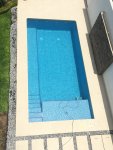I live in LA and just put in a pool. My house is modern/ mid century modern and the pool is rectangular with a spa in one corner and a Baja step beside it.
I need to choose tile and I am really struggling. I don’t really want to pay for glass and am afraid of it falling off and don’t even really love it anyway- at least not the busy mosaic stuff I am seeing.
I am doing white plaster and have very light grey square edge coping. I want something really simple, clean and modern. The top of the spa wall between the Baja step and the spa will also need to be tiled and I don’t want it to stand out with crazy blue tile.
I like simple but I don’t want it to look like a public pools .
Any ideas? What about unglazed tile?
Does white tile look dirty? How about a light grey or aqua tile? Can’t seem to find either. Only white and light blue. I’d love any advice on tile companies and tiles. My pool guy recommends universal tile but anything is ok.
Thanks!
I need to choose tile and I am really struggling. I don’t really want to pay for glass and am afraid of it falling off and don’t even really love it anyway- at least not the busy mosaic stuff I am seeing.
I am doing white plaster and have very light grey square edge coping. I want something really simple, clean and modern. The top of the spa wall between the Baja step and the spa will also need to be tiled and I don’t want it to stand out with crazy blue tile.
I like simple but I don’t want it to look like a public pools .
Any ideas? What about unglazed tile?
Does white tile look dirty? How about a light grey or aqua tile? Can’t seem to find either. Only white and light blue. I’d love any advice on tile companies and tiles. My pool guy recommends universal tile but anything is ok.
Thanks!





